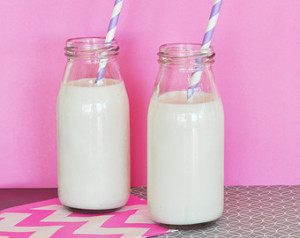 Navigating the dairy aisle has never been more confusing. Up until recently there was only one option for milk: cow’s milk. But with allergies and intolerances on the rise as well as controversy around dairy-rich diets, supermarket shelves are now lined up with a variety milk alternatives. You don’t need to be lactose intolerant or vegan to appreciate the different properties and flavours of milk alternatives. I’m a big advocate of dietary diversity to achieve your nutrient requirements, and these milks can offer a healthy substitute to float your morning cereal.
Navigating the dairy aisle has never been more confusing. Up until recently there was only one option for milk: cow’s milk. But with allergies and intolerances on the rise as well as controversy around dairy-rich diets, supermarket shelves are now lined up with a variety milk alternatives. You don’t need to be lactose intolerant or vegan to appreciate the different properties and flavours of milk alternatives. I’m a big advocate of dietary diversity to achieve your nutrient requirements, and these milks can offer a healthy substitute to float your morning cereal.
But before you flaunt your milky moustache, here are some pros and cons on common milk alternatives.
Soymilk
The mother of dairy free milks, soymilk was the first milk alternative to become mainstream. However, there has been much dispute over its estrogen-mimicking compounds, known as phytoestrogens. Some studies suggest these compounds may be responsible for reproductive problems in men and increased risk of breast cancer in women. Other studies show soy and its estrogenic effects are not only harmless, but actually beneficial in the treatment of breast and prostate cancer. The case is still on. But what we do know is that soy milk is the least processed of all dairy-alternative milks, highest in protein (6-8 grams/cup), low in saturated fat and widely available. Beware of sweetened and flavoured varieties and opt organic brands to avoid unnecessary pesticide consumption.
Almond milk
With its subtle nuttiness and a light texture, almond milk is gaining much popularity. Made with ground almond and water, almond milk is naturally low in calories and has all the health benefits you’d get from munching on a handful of nuts. Almonds are rich in manganese and magnesium, which help to create healthy bones and prevent depression, and selenium- an immune system booster that can help with your thyroid function. It is also high in Vitamin E, potassium, zinc, iron, fiber, phosphorous and calcium. While other forms of milk need to be fortified with vitamins, almond milk is naturally full of nutrients.
However, almond milk is typically lower in protein than other milks. Moreover, avoid brands that use carrageenan as a thickening agent. Carrageenan is an additive derived from seaweed, which has the potential to disrupt healthy gut bacteria – linked to ulcers, inflammation, and other gastrointestinal problems.
Rice milk
Rice milk is hypoallergenic, making it a safe option for those with food sensitivities. However, as it is derived from rice, it is higher in carbohydrates and sugar than other alternatives, and is low in vitamins, protein and calcium. Therefore, use rice milk sparingly, for example after a hard workout to assist recovery, or for baking as it holds well under heat. Choose lower sugar varieties and those without carrageenan.
Coconut milk
Creamy and thick, coconut milk is great in sweet desserts. It is rich in medium-chain triglycerides, a type of fat that is easily metabolized and suggested to promote weight loss. Although these fats are healthy, it should be consumed in moderation. Moreover, it is low in protein so muscle- builders should ensure to obtain protein from other dietary sources.
How to choose the best dairy free milk?
- Go fresh: Choose refrigerated milk, which have a shorter shelf life, and therefore fewer artificial ingredients.
- Read the nutritional labels: If you can’t pronounce the ingredients, leave it.
- Choose unsweetened/natural versions
Share your thoughts...